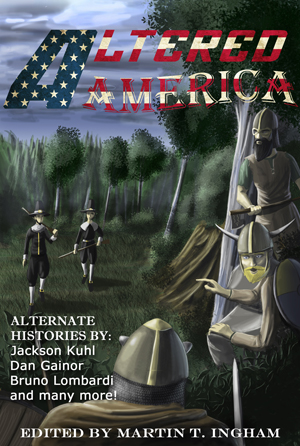 My story “Rio Grande” appears in the new alternate-history anthology, Altered America. Gambling gunfighter Lorenzo seeks vengeance against a card sharp in the Republic of the Rio Grande, an independent country based on the economic principles of Frederic Bastiat:
My story “Rio Grande” appears in the new alternate-history anthology, Altered America. Gambling gunfighter Lorenzo seeks vengeance against a card sharp in the Republic of the Rio Grande, an independent country based on the economic principles of Frederic Bastiat:
“When the Republicans defeated the Mexican army at Morales, everyone knew it was only a matter of time before Mexico tried again. They realized our little breakaway estado could only be held by force. Force means men. So they encouraged homesteading to grow the population. They tried various policies for a few years but nothing worked. Everyone wanted to go to California instead. Finally President Jordan discovered the writings of a French philosopher named Bastiat. This philosopher advocated free exchange. No taxes. No tariffs. No customs. A strictly confined government. ‘Law is organized justice,’ said the philosopher — anything beyond that is perversion. So they scrapped everything and started over with a new constitution based on his writings and principles. They advertised it in all the eastern newspapers. Cheap land. Live tariff free. Women can vote. And where there are women, there are men and soon enough children who grow up to defend against Mexico. Then there weren’t enough branches in the trees to beat back the settlers.”
“But how do you pay for the judges and the marshals? Who builds the courthouses?”
“The philosopher wasn’t against taxes so much as their unfair and arbitrary application,” said Valasquez. “So to keep everyone honest, there are none to begin with. Citizens can make donations. But that’s exactly how Jordan managed to convince his caudillo supporters to agree to the constitution. It meant only self-sufficient people could afford to be judges and marshals.”
“Only the wealthy, you mean.”
“How is that worse than America?”
Alien Space Bats maybe, but I’ve often wondered why banana-republic rebellions usually take such a distinctly left-hand turn. The answer, I suppose, is Marxism’s empty pledge to eliminate the elite classes, a mistake based on the assumption that class derives from economic systems rather than being a natural by-product of state-level civilization.
In any event, “Rio Grande” isn’t for or against libertarianism so much as it is a stab at that most pernicious of modern ideologies, utopianism. Earlier this week at Reason.com, author Anne Fortier noted the power of historical fiction:
To the freedom-friendly novelist, one further advantage of historical fiction is that the entire history of mankind is jam-packed with tragic examples of what Hayek called “the fatal conceit” and the corrupting effects of power — especially state power.
It’s worth reading her whole essay, though I’m not sure what business Fortier has throwing speculative fiction under the bus after writing a whole book about a mythological matriarchy (for all of her self-satisfaction, it seems Fortier hasn’t learned that genre — the difference of where you’re shelved in the bookstore — is simply packaging). But she’s right: history shows that power disparities are inevitable once a certain complexity of social organization is reached, and the key is not a false promise of eradicating those disparities but rather blunting power so that it does the least harm.
You can purchase the whole anthology here — I’m happy to report the Kindle edition has seen a steady burn of sales since its release — or read my complete story for free here. And if you enjoyed the antho, please leave a review at Amazon or Goodreads.
Excellent story! Would love to read more. Full books, trilogies, anything. Great characters, great setting, great plot. Fantastic.
Thanks Phil! Glad you got a kick out of it.